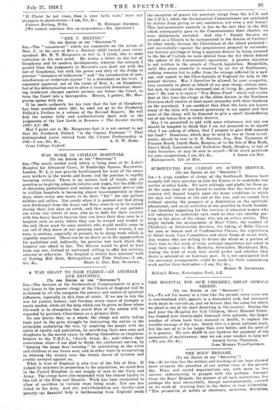"REX V. BILLING."
(To THE ED/TOR OF THE "SPECTATOR.") SIR,—The "amazement" which my comments on the action of Best, S., in the case of Rex v. Davison (1821) caused your corre- spondent Mr. E. T. Hargraves to feel is, I think, due to some confusion in his own mind. He writes a letter on the law of blasphemy and its modern developments, whereas the extraots I quoted from the judgments in Davison's case dealt not with the law of blasphemy, but with the power and duty of the Judge to prevent "instances of indecorum" and "the introduction of new, mischievous or irrelevant matter" by a defendant on his trial. I expressed approval, not of the views of Best, J., on blasphemy, but of his determination not to allow a truculent defendant, shout- ing irrelevant charges against persons not before the Court, to turn the Court into a bear-garden. Herein, I gather, Mr. Har- graves agrees with me.
If he needs authority for his view that the law of blasphemy has been modified since 1821, he need not go to Sir Frederick Pollock's Preface to a volume of the Revised Reports. He will find the matter fully and authoritatively dealt with in the judgments of the Law Lords in Bowman v. The Secular Society (1917) A.C. 406.
May I point out to Mr. Hargraves that it is not correct to say that Sir Frederick Pollock "is the Corpus Professor "? That distinguished jurist retired from the Corpus Professorship in


































 Previous page
Previous page